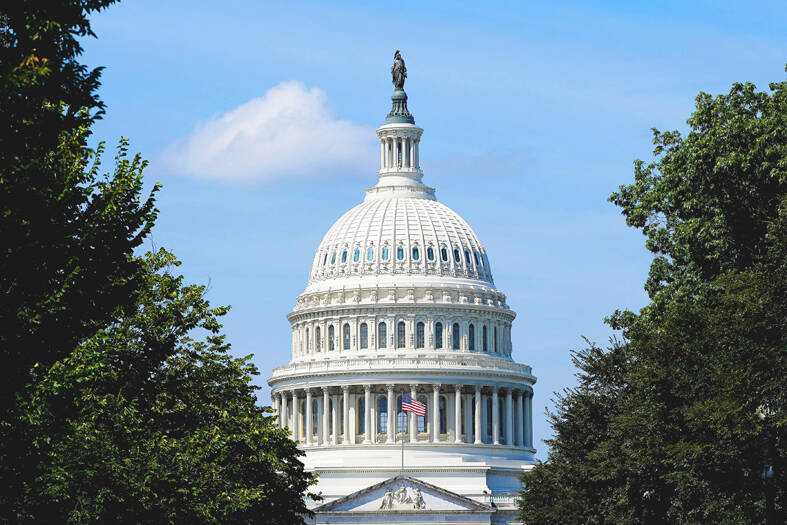A resolution introduced in the US Senate calls on Washington to sign a taxation agreement with Taiwan that would deepen bilateral economic ties and facilitate investment.
The resolution was introduced on Thursday by US Senator Chris Van Hollen — who chairs the Foreign Relations Subcommittee on East Asia, the Pacific, and International Cybersecurity Policy — subcommittee ranking member Senator Mitt Romney, and US senators Bill Cassidy, Tim Kaine, Todd Young and Chris Coons, Van Hollen said in a statement.
They called on the US government to negotiate a tax agreement “to further bolster economic ties” and eliminate double taxation for US businesses operating in Taiwan, the statement said.

Photo: Reuters
The resolution was initially introduced in the US Congress by Van Hollen and then-US senator Ben Sasse in July last year, during the previous legislative session.
The US has signed tax agreements with 66 countries, including China, but has no such agreement with Taiwan, its eighth-largest trading partner, data provided by Van Hollen showed.
Taiwanese investment in the US amounts to US$13.7 billion, and exports to Taiwan support nearly 190,000 US jobs, it showed.
Taiwan is a key economic partner of the US, but double taxation is “putting an undue burden on these enterprises and hampering opportunities for further partnership and investment,” Van Hollen said.
Based on the “deep and close ties between our two economies,” an agreement could ensure that a strong partnership would “continue to deliver tangible benefits to American and Taiwanese businesses and consumers,” Kaine said.
“Our relationship with Taiwan has never been stronger, yet our tax policy fails to reflect the strength and importance of this relationship,” Young said.
President Tsai Ing-wen (蔡英文) told US Senator Ed Markey that such an agreement is one of her priorities when he led a delegation to visit Taiwan in August last year.
US Senate resolutions have no legal weight, but they show where senate members stand on certain issues, and help apply pressure on the government.
Separately, the US-Taiwan Initiative on 21st-Century Trade might be signed by both sides “in the coming weeks” and lead to a bilateral trade or free trade agreement, should Washington wish to explore that option, a person familiar with the matter said.
The deal would be a “de factobilateral trade agreement” without addressing tariffs or free trade, the person said.
The initiative was unveiled by Taipei and Washington in June last year after Taiwan was excluded from the Indo-Pacific Economic Framework, a US-led multilateral partnership involving 13 other countries.
The framework has been touted as a counterweight to a China-initiated free-trade pact in the region.
Additional reporting by CNA

INVESTIGATION: The case is the latest instance of a DPP figure being implicated in an espionage network accused of allegedly leaking information to Chinese intelligence Democratic Progressive Party (DPP) member Ho Jen-chieh (何仁傑) was detained and held incommunicado yesterday on suspicion of spying for China during his tenure as assistant to then-minister of foreign affairs Joseph Wu (吳釗燮). The Taipei District Prosecutors’ Office said Ho was implicated during its investigation into alleged spying activities by former Presidential Office consultant Wu Shang-yu (吳尚雨). Prosecutors said there is reason to believe Ho breached the National Security Act (國家安全法) by leaking classified Ministry of Foreign Affairs information to Chinese intelligence. Following interrogation, prosecutors petitioned the Taipei District Court to detain Ho, citing concerns over potential collusion or tampering of evidence. The

‘FORM OF PROTEST’: The German Institute Taipei said it was ‘shocked’ to see Nazi symbolism used in connection with political aims as it condemned the incident Sung Chien-liang (宋建樑), who led efforts to recall Democratic Progressive Party (DPP) Legislator Lee Kun-cheng (李坤城), was released on bail of NT$80,000 yesterday amid an outcry over a Nazi armband he wore to questioning the night before. Sung arrived at the New Taipei City District Prosecutors’ Office for questioning in a recall petition forgery case on Tuesday night wearing a red armband bearing a swastika, carrying a copy of Adolf Hitler’s Mein Kampf and giving a Nazi salute. Sung left the building at 1:15am without the armband and apparently covering the book with a coat. This is a serious international scandal and Chinese

Seventy percent of middle and elementary schools now conduct English classes entirely in English, the Ministry of Education said, as it encourages schools nationwide to adopt this practice Minister of Education (MOE) Cheng Ying-yao (鄭英耀) is scheduled to present a report on the government’s bilingual education policy to the Legislative Yuan’s Education and Culture Committee today. The report would outline strategies aimed at expanding access to education, reducing regional disparities and improving talent cultivation. Implementation of bilingual education policies has varied across local governments, occasionally drawing public criticism. For example, some schools have required teachers of non-English subjects to pass English proficiency

TRADE: The premier pledged safeguards on ‘Made in Taiwan’ labeling, anti-dumping measures and stricter export controls to strengthen its position in trade talks Products labeled “made in Taiwan” must be genuinely made in Taiwan, Premier Cho Jung-tai (卓榮泰) said yesterday, vowing to enforce strict safeguards against “origin laundering” and initiate anti-dumping investigations to prevent China dumping its products in Taiwan. Cho made the remarks in a discussion session with representatives from industries in Kaohsiung. In response to the US government’s recent announcement of “reciprocal” tariffs on its trading partners, President William Lai (賴清德) and Cho last week began a series of consultations with industry leaders nationwide to gather feedback and address concerns. Taiwanese and US officials held a videoconference on Friday evening to discuss the